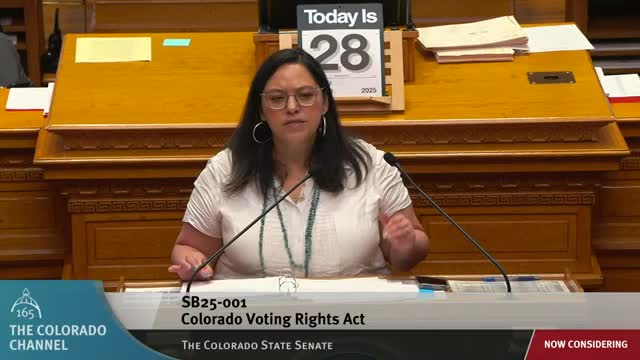Senate narrows consumer-protection hurdle for targeted groups, passes bill to revive private suits for certain deceptive practices
Get AI-powered insights, summaries, and transcripts
Subscribe
Summary
After contentious debate, the Senate passed Senate Bill 157 with a floor amendment narrowing the measure so claims that avoid the judicial 'significant public impact' requirement apply to targeted groups (seniors, veterans, service members, people with disabilities and pregnant individuals).
Senate Bill 157 cleared the Senate on March 28 after the body adopted an amendment (L6) narrowing the bill’s scope to target groups—seniors (60+), current service members, veterans and gold‑star spouses, people with disabilities and pregnant individuals—before removing the judicially created “significant public impact” barrier for private consumer-protection claims.
Sponsor Senator Weisman framed the bill as a restoration of consumer remedies stripped from Colorado law by a 1998 Colorado Supreme Court decision that inserted a judicial requirement of “significant public impact” before private plaintiffs could bring Colorado Consumer Protection Act claims. “Other states do not require this extra hurdle,” Weisman said. “Consumers and small businesses deserve a workable private enforcement remedy when they are deceived.”
Nut graf: The adopted amendment narrowed the bill to groups that data and advocates say are disproportionately targeted by fraud, including older adults, service members and people with disabilities. Supporters emphasized rising reported fraud losses and reduced federal enforcement capacity; opponents said adopting the change would significantly increase litigation exposure, drive up liability insurance and impose costs on businesses and health-care providers.
On the floor, debate highlighted competing risks: proponents cited Federal Trade Commission data showing rising fraud reports and losses and argued states must step in where federal enforcement is contracting. Opponents pressed the economic impacts, arguing the bill could raise defensive medical costs, insurance premiums and legal risk for multiple sectors. Several opponents warned it would increase “social inflation” and could have a chilling effect on service providers.
Amendment L6, adopted on the floor, removed the originalwide “significant public impact” repeal and replaced it with a narrower carve-in for the specified protected groups. The Senate then adopted further committee edits and ultimately passed the bill. Supporters hailed the compromise as targeted relief that restores private enforcement for the groups most commonly targeted by deceptive practices; critics said the step could still produce costly unintended consequences and predicted legal fights to follow.
Vote: After a division and floor consideration, the Senate adopted the narrowed amendment and passed the repackaged Senate Bill 157.
